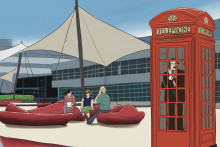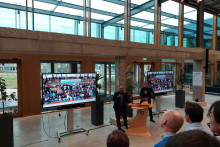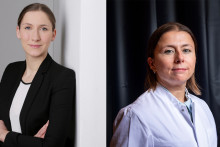For almost a year now, the number of internationals in Dutch universities is one of the discussion points in national politics. Several parties, like Nieuw Sociaal Contract of Pieter Omtzigt, are worried about the number of international students coming to The Netherlands. A majority of political parties, from left to right, supported a motion asking to reduce the use of the English language on universities.
‘Dutch politics increasingly negative’
With these developments as the backdrop for the political discussion, six independent news media at the universities of Groningen, Utrecht, Nijmegen, Delft, Wageningen and Twente conducted a survey amongst international students and employees. The survey was filled out by about 1330 respondents, of which 100 respondents were UT students and employees.
The results show that international students and staff members of Dutch universities feel less welcome than when they came here. Over 70 percent of the students and staff members felt welcome or even very welcome when they came to The Netherlands. Now this is only 55 percent. Meanwhile, the number of people feeling (very) unwelcome have risen from 16,5 to 25 percent. The numbers at the University of Twente follow this trend; at first, 68 percent felt (very) welcome. These numbers have dropped to 40 percent.
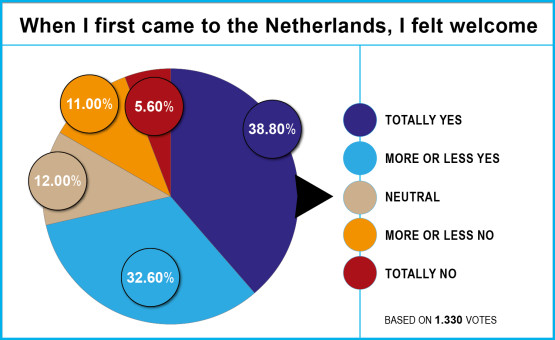
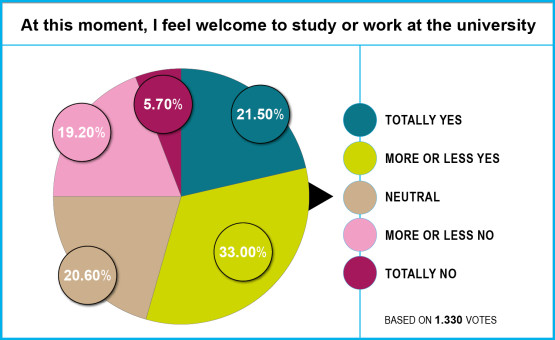
For an explanation on their perceptions, about 50 percent of students and staff members give the Dutch politics being increasingly negative about internationals as an argument. About 30 percent of the respondents mark out that the media are negative about internationals.

‘Stupid, populist, short-sighted’
A majority of the respondents is aware of the parliament pushing these measures to restrict the number of international students. Over 90 percent of the respondents have at least heard about them. Over 80 percent of the respondents are aware of the strong movement towards reducing the use of the English language.
Feelings on the political discussion are mixed, the open answers in the survey results show. Numerous respondents say it’s ‘stupid’, ‘populist’ and ‘short-sighted’. Others elaborate a bit more: ‘I think it’s suicide for the Dutch society if they reduce internationalization. The Netherlands stand today as a very well-desired country, exactly due to its past open-mindedness in internationalization’, says an Indian academic staff member.
‘I don’t understand why they attracted so many people and charged them a lot of money and now changed their mind. I think they do need the people, this country has a lack of workers and an aging population’, adds a Mexican master’s student. And an American master’s student says: ‘I think it makes sense the government wants to prioritize Dutch students, but it seems quite restrictive to implement language quotas within the programs. Such a measure will drastically decrease the international populations, so much that the university may begin to struggle to fill certain programs, such as those offered by the ITC faculty.’
Indicative survey results
Due to the (open) nature of the survey and the total number of respondents, its results can be interpreted as indicative. These results give insight into the sentiments of international students and employees at the University of Twente and other Dutch universities.
Feeling welcome
Most respondents feel more welcome inside the university compared to outside the university: about half of the respondents prefer academia, whereas 37 percent feels no difference. ‘The university is more positive about internationalisation, so it feels like a safer place to be an immigrant’, responds an American support staff member at the UT. ‘Inside the university there is a sense of community, and even if we don't all speak the same language, we have something in common. Outside of the university it can sometimes be challenging to connect with native people from Enschede’, adds a Spanish bachelor’s student. And, according to a German PhD candidate, ‘the UT still seems to try to stay International despite the national pressure’.
‘People will not look at you as a human until you speak Dutch’ - A Ukrainian bachelor's student
However, there is also criticism whether the UT’s own environment is that welcoming. ‘Inside the university people fake a nice face to foreigners. Outside the university Dutch people just bully other colour people directly, without any consequences’, remarks a Chinese PhD candidate. Students mention a divide between Dutch and international students. ‘At the university, Dutch people hang out with Dutch, and my master’s is mainly Dutch students’, says a Greek master’s student. And a Ukrainian bachelor’s student adds: ‘People will not look at you as a human until you speak Dutch.’
Leaving The Netherlands?
According to the survey results, about 17 percent of the internationals speaks more or less fluent Dutch, while another 40 percent speaks a bit of Dutch. Of the respondents that don’t speak Dutch or speak it a little bit, more than half is definitely willing to learn the language. Only 6 percent would not like to learn the Dutch language.
About 30 percent of the respondents think about leaving The Netherlands because of the internationalisation debate. Not all internationals make plans to leave the Netherlands because of the internationalization debate. Postdocs and PhD candidates are the most willing to stay, while other academic staff thinks about leaving slightly more. ‘I don't want to leave, but I fear I might have to due to unsuficient language skills’, says an academic staff member. ‘I don’t have the capacity to learn Dutch in a way that I could teach’, states a German academic staff member. And a German master’s student says: ‘I don't want to stay in a country that is pushing for less internationals.’
‘I would just make it very clear that integrating within the Dutch society is not as easy’ - a Mexican PhD candidate
Uncertainty
The survey results also show that on average, students and staff members are neutral to slightly not-worried about their position at the university. At the University of Twente however, the respondents are more worried than at other universities who participated in the survey. Looking at the open answers at the question ‘Can you explain why you would or would not recommend others to work or study here?’, the UT respondents share their uncertainty.
‘I had a very good experience studying here for the last couple of years, but if the current trend continues, I'm not so sure if it's going to be the same anymore’, says a German master’s student. ‘It's still possible to work and live if you don't speak Dutch well but the Dutch politics are increasing becoming hostile against non-Dutch’, adds a Turkish academic staff member.’ And, concludes a Mexican PhD candidate: ‘I would not advice against or for it. I would just make it very clear that integrating within the Dutch society is not as easy.’


